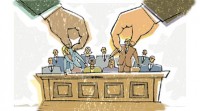
Martinorellan v. State (Nev. Supreme Ct. – Feb. 26, 2015)
In this case, the Nevada Supreme Court considered the district court’s failure to instruct a jury to restart deliberations as is required by NRS 175.061(4) after an alternate juror replaced a regular juror.
“Martinorellan entered a smoke shop and stabbed the store’s owner while attempting to commit a robbery. At trial, the jury deliberated for approximately 1 hour and 15 minutes before the district court convened a hearing, dismissed a juror who stated that he knew the victim, and replaced that juror with an alternate juror. The district court did not recall the jury to the courtroom or instruct it to restart deliberations. Martinorellan did not object to the district court’s decision not to recall the jury and instruct it to restart deliberations. The reconstituted jury deliberated for nearly 4 hours and 30 minutes over two days and viewed a playback of testimony before convicting Martinorellan of burglary while in possession of a deadly weapon, attempted robbery with the use of a deadly weapon, and battery with the use of a deadly weapon.”
On appeal, Martinorellan argued that the failure to instruct the jury to restart deliberations after an alternate juror replaced an original juror was an error of constitutional dimension because it interfered with his constitutional right to a trial by a fair and impartial jury. The State argued that this error was not of constitutional dimension because the district court did not prevent the jury from restarting deliberations after the alternate juror was seated.
The Nevada Supreme Court reasoned that the failure to instruct a jury to restart deliberations after an alternate juror replaces an original juror during deliberations can create the risk of the original jurors exerting undue influence on the alternate juror. Since this infringes on a defendant’s right to a trial by an impartial jury, the Court held that the district court’s failure to instruct the jury to restart deliberations was an error of constitutional dimension.
What standard of review for unpreserved constitutional errors?
At trial, Martinorellan did not object to the district court’s decision not to recall the jury. However, he argued that the standard of review for an unpreserved constitutional error should be the same as that for a preserved constitutional error. Citing Johnson v. United States, 520 U.S. 461, 465-66 (1997), the Court held that all unpreserved errors are to be reviewed for plain error without regard as to whether they are of constitutional dimension.
Continue reading “What happens when an attorney fails to object to a constitutional error at trial?”
